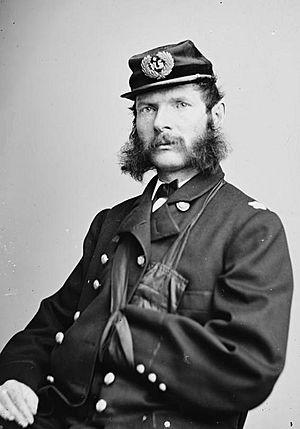Samuel S. Carroll facts for kids
Quick facts for kids
Samuel Sprigg Carroll
|
|
|---|---|

Samuel S. Carroll
|
|
| Nickname(s) | "Red" |
| Born | September 21, 1832 Takoma Park, Maryland |
| Died | January 28, 1893 (aged 60) near Takoma Park, Maryland |
| Place of burial |
Oak Hill Cemetery (Washington, D.C.)
|
| Allegiance | United States Union |
| Service/ |
United States Army Union Army |
| Years of service | 1856–1869 |
| Rank | |
| Commands held | 8th Ohio Infantry Gibraltar Brigade |
| Battles/wars | American Civil War |
Samuel Sprigg "Red" Carroll (born September 21, 1832 – died January 28, 1893) was an important officer in the United States Army. He became a brigadier general during the American Civil War. Carroll, who was from Maryland, was famous for leading the "Gibraltar Brigade." This infantry brigade was part of the Army of the Potomac. They played a key role in defending Cemetery Hill during the Battle of Gettysburg. They also helped push back part of Pickett's Charge.
Contents
Early Life and Military Training
Samuel S. Carroll was born near what is now Takoma Park, Maryland. He was related to Charles Carroll of Carrollton, who signed the Declaration of Independence. Samuel went to local schools. Later, he was accepted into the United States Military Academy in West Point, New York.
He finished his studies at West Point in 1856. He became a second lieutenant in the infantry. His first jobs were at different army posts in the Old West. After that, he returned to West Point to work as the quartermaster, managing supplies.
Service During the Civil War
When the Civil War began, Carroll quickly moved up in rank. He became a captain in the 10th U.S. Infantry. In December 1861, he was made a colonel of the 8th Ohio Infantry. This regiment fought only in the Eastern Theater.
Key Battles and Injuries
During the 1862 Valley Campaign, Carroll led the 4th Brigade. He was praised for his actions at the Battle of Cedar Mountain. He was badly wounded in the chest near the Rapidan River. After he recovered, he returned to lead his troops in the III Corps before the Battle of Fredericksburg.
In 1863, Carroll commanded the 1st Brigade, 3rd Division of the II Corps at the Battle of Chancellorsville.
The Battle of Gettysburg
During the second day at Gettysburg, Carroll's 8th Ohio regiment fought along the Emmitsburg Road. His other three regiments, known as the Gibraltar Brigade, launched a counter-attack. They pushed back Confederate soldiers from North Carolina and the Louisiana Tigers on Cemetery Hill. This happened as darkness fell. Carroll later led his brigade in smaller fights during the Mine Run Campaign.
Carroll was promoted to brigadier general on May 12, 1864. He was wounded two more times during the Overland Campaign. Once at the Wilderness and again at Spotsylvania Court House. His left arm was amputated because of his injuries. After he recovered, he briefly commanded the Department of West Virginia. He then led a division in the Army of the Shenandoah.
After the War
After the war ended, Carroll stayed in the Regular Army. He worked in the inspector general's department. Because of his war injuries, he retired from the army in 1869. He held the honorary rank of major general.
Later Life and Legacy
In January 1893, Samuel Carroll became sick with pneumonia. He died six days later at his home, "Belleview," near Takoma Park, Maryland. He was 60 years old. His death was made worse because he never fully recovered from his war wounds.
His funeral was held in Washington, D.C. He was buried with full military honors at Oak Hill Cemetery in Georgetown, Washington, D.C.. Today, the main street in Takoma Park is named Carroll Avenue in his memory.
 | Shirley Ann Jackson |
 | Garett Morgan |
 | J. Ernest Wilkins Jr. |
 | Elijah McCoy |

